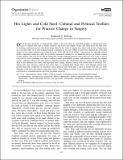Hot Lights and Cold Steel: Cultural and Political Toolkits for Practice Change in Surgery
Author(s)
Kellogg, Katherine C.
DownloadKellogg_Hot Lights and Cold Steel_Org Sci.pdf (174.2Kb)
PUBLISHER_CC
Publisher with Creative Commons License
Creative Commons Attribution
Terms of use
Metadata
Show full item recordAbstract
One of the great paradoxes of organizational culture is that even when less powerful members in organizations have access to cultural tools (such as frames, identities, and tactics) that support change, they often do not use these tools to challenge traditional practices that disadvantage them. In this study, I compare data about work practice change from my own field study of an elite teaching hospital (conducted in the early 2000s) to previously reported data from field studies of two similar hospitals (one conducted in the 1970s and one in the 1990s). I demonstrate that although cultural toolkits supporting change may allow less powerful organization members to see traditional practices as running counter to their interests, they may not be able to significantly change traditional practices unless they also have access to what I call political toolkits (including tools such as staffing systems, accountability systems, and evaluation systems) that support change. Although cultural tools allow them to reinterpret practices that disadvantage them as unfair, political tools allow them to feel optimistic that others will help them effect change. Whereas cultural tools enable them to develop a “we” feeling with other reformers, political tools allow them to coordinate their change efforts. And although cultural tools provide them with a repertoire of contentious tactics, political tools afford them a sense of security that they can battle defenders of the status quo without ruining their careers. These findings contribute to our understanding of both the cultural construction of organizational life and social movement processes.
Date issued
2010-07Department
Sloan School of ManagementJournal
Organization Science
Publisher
Institute for Operations Research and the Management Sciences (INFORMS)
Citation
Kellogg, Katherine C. “Hot Lights and Cold Steel: Cultural and Political Toolkits for Practice Change in Surgery.” Organization Science 22.2 (2011): 482–502. © 2011 INFORMS
Version: Final published version
ISSN
1047-7039
1526-5455